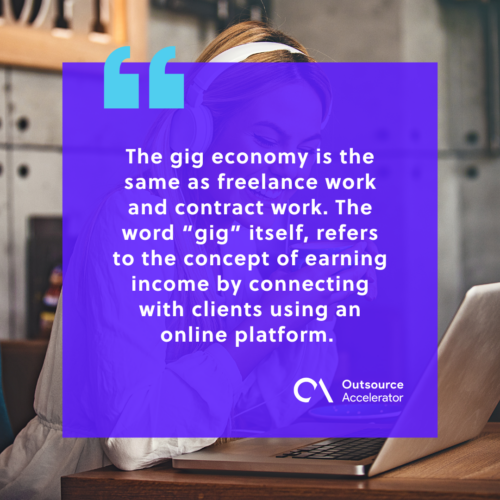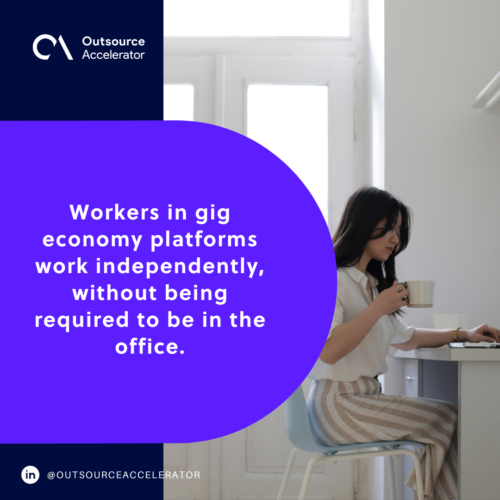12 Best gig economy platforms for your side hustle

- Prospa
- Fiverr
- Upwork
- appen
- Crowdspring
- Tongal
- Toptal
- 99designs
- Freelancer
- Contently
- FreelanceDiary
- PeoplePerHour
The gig economy is among the great benefits of modernized technology. Workers can find other ways of earning extra income through various gig economy platforms available online.
As the business sector starts to fully embrace remote work, many traditional employees are also opting to look for jobs on these gig economy platforms.
Over the past few years, gig job seekers have utilized various gig platforms to look for part-time jobs, freelance projects, or even full-time jobs online.
As for businesses, it is where they can find freelancers or independent contractors to handle specific tasks that do not require a full-time employee.
In this article, we’ll discuss the significance of the gig economy in today’s global working environment.
How do gig economy platforms benefit both employers and employees? Lastly, we have outlined twelve leading gig economy platforms that you can utilize for your side hustle.
Gig economy platforms: What is the gig economy?
The gig economy is the same as freelance work and contract work. The word “gig” itself refers to the concept of earning income by connecting with clients using an online platform.
Gig worker definition
The gig economy is made up of various groups of working individuals and professionals with different specializations and skills.
A gig worker can either be a freelancer or an independent contractor.
Some gig economy platforms are exclusive to certain types of professionals offering specified services. Other gig platforms, on the other hand, are open to the working class with diversified skills.
The gig economy is not just about flexible jobs, earning extra money, or job security.
One of the many benefits of the gig economy is that it connects gig workers offering professional services with businesses, allowing both ends to widen their networks and create more opportunities.
Some jobs in these gig economy platforms may last as short as an hour or a few minutes. In contrast, some may last for months or even long-term, depending on the client or type of project.

Gig jobs available on gig economy platforms
In this day and age, earning a decent living is no longer solely applicable to full-time employees. A typical gig is usually any type of digital service.
Some gig workers also opt for physical side hustles. Even running errands for other people can be a form of gig job.
From online grocery delivery services to online food delivery companies, individuals can now explore a range of flexible employment opportunities that suit their availability and preferences.
We have outlined some of the gig jobs that are currently considered on-demand services. These are examples of job postings that you will see on gig economy platforms:
- Food delivery service, delivering groceries, alcohol delivery service, or other forms of delivery service
- Reselling/selling goods online
- Graphic design
- Digital marketing
- Copywriting
- Social media management
- Web development
- Customer services
- Software development
These innovative gig economy companies provide individuals with opportunities to work on short-term projects, freelance contracts, or part-time gigs, enabling them to embrace flexibility and diversify their income streams.
Which working class is in the gig economy platforms?
In general, individuals who participate on gig economy platforms are people who opt to have flexible jobs or are looking to earn extra money.
Who are these gig workers?
As per a study published by Mckinsey in 2016, four independent workers can be found in gig economy platforms:
- Casual earners – these are workers who make use of independent work as a secondary income source.
- Free agents – are working-class people who utilize gig economy platforms as their primary source of income.
- Financially strapped – like casual workers, these individuals seek additional income by doing independent work out of necessity.
- Reluctants – these are people who prefer traditional jobs but are making their main source of living on independent work.
How these gig economy platforms benefit companies and gig workers
In the US, over 36% of the working population is on gig economy platforms for various career opportunities due to the COVID-19 pandemic.
Gig economy platforms benefit both workers and businesses. Small business owners primarily take full advantage of gig workers as they are able to save more money.
Gig economy platforms provide working arrangements that suit current needs and flexible lifestyles. These platforms make remote work even more possible.
Advantages of gig economy platforms on companies
As for various companies, gig economy platforms provide them with the following benefits:
Cost-saving
Companies can save up to tens of thousands on gig workers compared to hiring a full-time in-house employee. For one, they are not required to provide benefits, office space, and other resources to a gig worker. They will only have to pay for fixed-price projects.
This is especially true for small businesses, which often operate on a tight budget. Employing workers on a freelance basis helps them stay ahead of their competition while securing their finances.
Freedom to hire seasonal and temporary workers
This is perfect for seasonal businesses that also need seasonal workers to support their operations during busy seasons. Some companies turn to agencies like outsourcing providers.
While it may be a form of a gig job, these third-party providers also charge additional fees that may immediately add up.
In-house employees can do more high-value tasks
By sourcing out work to independent contractors on gig economy platforms, business leaders can pass on low-value tasks. In turn, in-house employees can shift their focus to doing more high-value and essential tasks.
Advantages of gig economy platforms on workers
As for workers in gig economy platforms, they are given the following advantages:
Flexibility
One of the great benefits of the gig economy for workers is that they have the freedom to work their desired hours. Besides having a flexible schedule, they also have the liberty to choose where they want to work while completing tasks.
Wide variety of available jobs
Workers on gig economy platforms always have a wide range of flexible job options to choose from. Rather than sticking to routine tasks, gig workers can work on different job functions on each project or client.
Independence
Workers in gig economy platforms work independently, without being required to be in the office. Their tasks are essentially handed over to them. With gig jobs, it is the employees’ responsibility to complete them on their own and at the agreed deadline.
Having to work independently on one project while not being micromanaged can give you a boost of confidence. More so, it teaches you to be more responsible and focused in finishing your work on time.
Connecting people
Apart from providing jobs for side hustles and earning money, gig economy platforms also connect people. Gig workers can network with other gig workers, meet more clients, and boost their skills and knowledge in the industry.

Top 12 gig economy platforms for your side hustle
Here we have the twelve best gig economy platforms you can make use of for an added income:
1. Prospa
Prospa is a gig economy platform that is created by Outsource Accelerator. It gives individuals the chance to explore wider job opportunities for remote work.
At the same time, it is also an excellent platform for companies across the globe that are looking for top-notch Filipino talents.
2. Fiverr
Fiverr is one of the popular gig economy platforms for freelancers around the world. It is open for the working class in digital marketing, graphic design, writing & translation, video & audio, and video & animation sectors.
This gig economy platform also has an array of job opportunities for people in the IT, business, data, and lifestyle industries.
3. Upwork
Upwork has always been a go-to and trusted platform for many gig workers and employers across the globe. It is considered one of the gig economy platforms with the biggest network of professionals with their fields of specialization.
Upwork supports both companies and individuals in the design & creatives, IT, sales & marketing, writing & translation, and finance & accounting fields.
4. appen
appen is one type of gig economy platform that is for professionals in the IT industry. It has partnered with renowned multinational companies in the technology field like Microsoft, AWS, and Google Cloud.
appen has IT professionals who offer AI-powered solutions to various industries for over twenty years now. It caters to clients in the automotive, financial services, healthcare, government, and retail business sectors.
5. Crowdspring
Crowdspring is among the gig economy platforms that are created for creative professionals, specifically for designers. But unlike the usual gig economy platforms, Crowdspring has an auction methodology in securing clients.
In Crowdspring, companies post their projects and requirements. Designers will then submit their proposed design concepts for their desired job opportunity. According to the platform, it currently has over 200,000 designers spread across 195 countries around the world.
6. Tongal
Tongal is a perfect avenue that connects people, particularly content creators to multinational brands. It is where renowned brands like Sesame Street and Warners Bros can look for top-grade writers, directors, animators, and editors.
Tongal is one of the gig economy platforms used in 177 countries. Currently, it houses over 200,000+ independent creators.
7. Toptal
Toptal is an exclusive platform for experienced software developers, project managers, product managers, finance experts, and designers.
It is a platform that is strongly trusted by some of the leading companies like Airbnb, Shopify, Duolingo, and Bridgestone.
8. 99designs
99designs is another gig economy platform that caters to graphic designers. This platform is perfect for companies looking to tweak or create their logos & identity, web & app design, and packaging & label.
The platform also has graphic designers who can work on projects related to business & advertising, illustration & art, including clothing & merchandise. Design prices range from $100-$500 per project.
9. Freelancer
Freelancer is a gig economy platform that is open to a variety of working professionals with specialized skills. Employers are able to categorize their job postings and filter out applicants via their skills or locations.
As for workers, you can search for projects in different languages like Portuguese, German, Spanish, French, or English.
10. Contently
Contently provides job functions that are involved in content marketing. This gig economy platform is backed by over 10 years of industry experience in the marketing industry.
Additionally, Contently claims to generate an average of $13.1 million content value ROI annually.
11. FreelanceDiary
FreelanceDiary is a platform that comes with management and collaboration tools like time tracking, calendar, and contact list apps. Employers are given a chance to view their hired freelancer’s calendar and send task invites according to their availability.
Employers can also hire their teams of gig workers to take on a specific project based work and utilize the platform’s collaborative tools.
12. PeoplePerHour
Unlike other gig economy platforms, PeoplePerHour is committed to utilizing new technologies as it is an AI-powered gig website. It helps working professionals in different fields connect with possible clients from across the world.
PeoplePerHour’s featured services involve IT, writing & translation, digital marketing, design, social media, and marketing.
Gig economy platforms: The future of gig economy
Tech advancements are continuously revolutionizing the way businesses operate and the way people perform their daily jobs. The surge of workers turning to gig economy platforms only shows that people at present prioritize a work-life balance.
The gig economy gives you the freedom to choose which projects or tasks you want to work on. It gives you the flexibility to work on your tasks at your own pace.
While technically, you are still working for a client, gig jobs give you the sense of being your own boss as you perform your job independently.







 Independent
Independent




